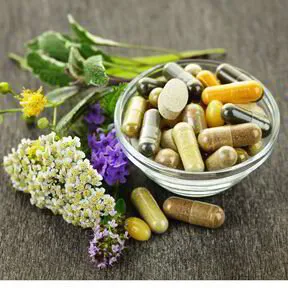People love to be helpful. Mention that you have been diagnosed with cancer, and you can potentially receive hundreds of ideas from well-meaning friends and loved ones. However, how do you know if a suggested vitamin, herb or supplement is safe to combine with your prescribed cancer treatment?
You might be fortunate to have an oncologist who is well versed in using supplements, but it is not commonly the case. Nevertheless, it is always advised that you let your oncologist know what you are taking, which includes vitamins, herbs and supplements.
Supplements have the potential to work synergistically with your treatment and reduce side effects, but they also have the potential to cause harm. Here are some possible ways that supplements can interact with your cancer treatment…
- Most commonly, they can change how fast liver enzymes eliminate a drug from your body. Too fast and you won’t get the full effect of the drug. Too slow and the drug stays in your body longer causing more side effects and toxicity. Many of these liver enzyme pathways are called “Cytochrome P450” and the enzyme names begin with “CYP.”
Example: Say your friend recommends an energy supplement for you after chemotherapy because you feel so exhausted. You are taking Taxol which is metabolized through the CYP3A4 pathway. This supplement has licorice which inhibits the CYP3A4 pathway. The combination of the two together could make the chemotherapy more toxic.
Some supplements can decrease the absorption of oral medications when taken within a couple of hours of each other. Activated charcoal, fiber, and mucilaginous herbs like marshmallow root can either bind up the medication or put a thick slimy layer over your digestive tissues making the medication hard to absorb.
If you are on a medication that is blocking the effects of estrogen (such as aromatase inhibitors), it is recommended to avoid herbs that may have an estrogenic effect, such as maca, soy protein isolate and licorice root. Note that soy in food form may be safe, but soy supplements and soy protein isolate may not be.
Probiotics and probiotic foods (such as yogurt with active cultures, raw sauerkraut, kombucha, and kefir) contain beneficial strains of bacteria. There are two situations where they might cause harm.
If your white blood cell count (CBC) is below 2.5 or if your absolute neutrophil count (ANC) is below 1.0, these beneficial bacteria may go rogue without the healthy checkpoints in your immune system working properly and cause a systemic infection in your body. It doesn’t happen all the time, but there have been over 200 case reports of this happening.
Second, there is some early research coming out that taking probiotics may decrease the effectiveness of certain immunotherapies, but taking prebiotics (thought of as the food that feeds the bacteria) may be helpful. You can get prebiotics naturally in your diet by eating foods higher in fiber.
- Next, there are the interactions we have discovered through scientific studies. For example, we know that high dose vitamin A should be avoided with the drug 5-FU. We also know that certain antioxidants may interfere with certain chemotherapies and radiation. However, not all antioxidants have demonstrated harm, and many times it is dose dependent.
For example, melatonin is a well-known antioxidant that has been shown in meta-analyses to be beneficial for certain tumor types when combined with chemotherapy and radiation, but this is not true of every antioxidant.
- Certain supplements are well known to increase bleeding and bruising such as ginkgo and vitamin E. It is best to only use these under careful medical supervision and lab monitoring if you are on other medications that can cause easy bleeding such as Avastin or aspirin.
- Sometimes blood pressure can drop too low for a person to safely receive their treatment. You might think low blood pressure is a good thing, but it can cause people to pass out and experience traumatic falls. Many supplements can potentially lower blood pressure and make the problem worse, such as melatonin and certain mushroom extracts.
If you choose to integrate supplements into your care, it is recommended you let your oncologist know what you are taking and work with a professional who is knowledgeable in drug-supplement interactions and who knows how to evaluate the evidence so you can make an informed decision.
I have worked alongside oncologists and people undergoing cancer treatment for over 13 years helping people safely navigate these decisions, and I’m here for my clients to help them evaluate supplements when a friend or loved one suggests something new.
Katrina Bogdon, Naturopathic Doctor
Katrina Bogdon, ND graduated from a four-year accredited naturopathic medical school in North America. She completed a two-year residency in naturopathic oncology and served at Cancer Treatment Centers of America in Tulsa, OK for 5 years. She is trained to work integratively with conventional oncology care and also provides care for people without a cancer diagnosis.


